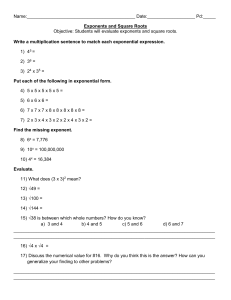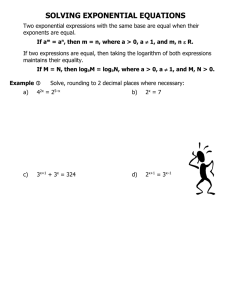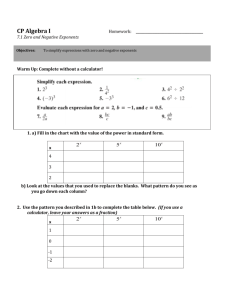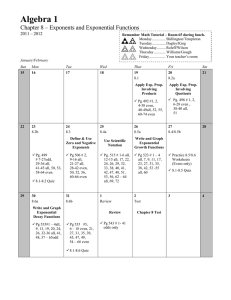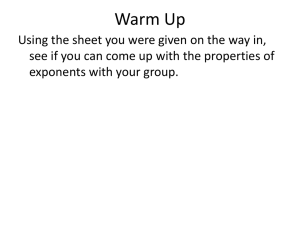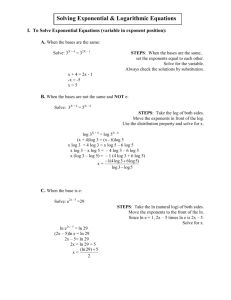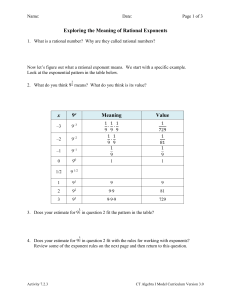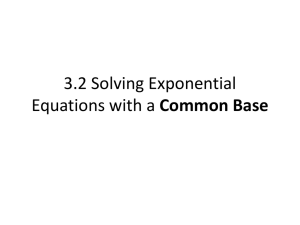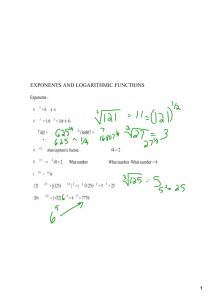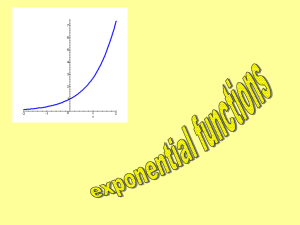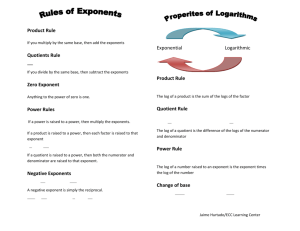Properties of Exponential Functions
advertisement
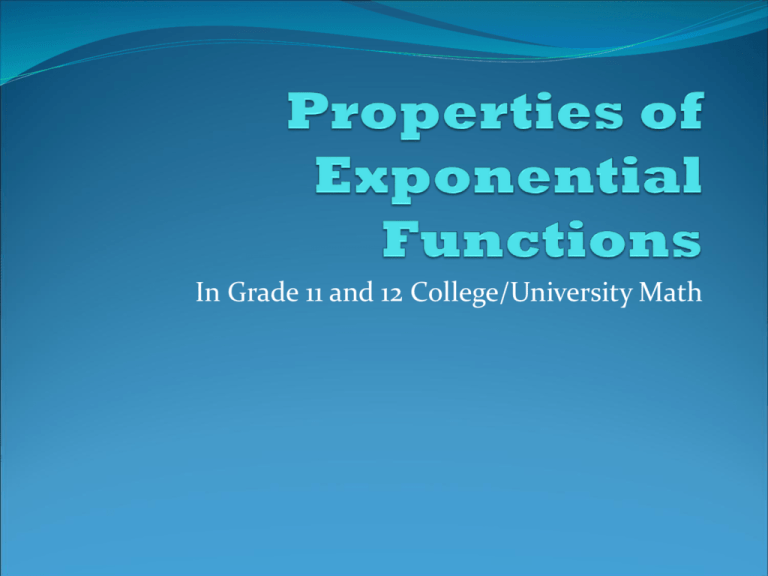
In Grade 11 and 12 College/University Math The 3 Overall Expectations Simply put, the grade 11/12 curriculum asks that the students be able to… 1. Evaluate and simply expressions containing exponents 2. Make the connection between the numeric, graphical, and algebraic representations (Graph them! Transform them!) 3. Solve real-world applications involving exponential functions. How to Get Started… Here are some functions that the students should be familiar with after learning Trigonometric functions… Hint: this picture is a warmup of what’s to come! The Exponent Laws Law Example x1 = x 61 = 6 x0 = 1 70 = 1 x-1 = 1/x 4-1 = 1/4 xmxn = xm+n x2x3 = x2+3 = x5 xm/xn = xm-n x6/x2 = x6-2 = x4 (xm)n = xmn (x2)3 = x2×3 = x6 (xy)n = xnyn (xy)3 = x3y3 (x/y)n = xn/yn (x/y)2 = x2 / y2 x-n = 1/xn x-3 = 1/x3 And the law about Fractional Exponents: This way.. This way, students can simply algebraic expressions containing integer and rational exponents… Examples: simplify the following two 41/2 x 4 ½ = X3 / X1/2= (X6y3)1/3= So then, Introducing Exponential Functions! They involve exponents Examples: y=2x y=3x y=bx Start off with f(x) = bx x is the exponent b is the base Students should be able to graph with calculators, paper and pencils, and graphing technology based on a table of values. Then looking at a basic exponential function, students need to… 1.4 – determine the key properties relating to domain and range, intercepts, increasing/decreasing intervals, and asymptotes. f(x)=2x And the properties are… Domain: Range: The set of real numbers Set of positive real numbers Intercepts: Dependant on the a value of f(x)=abx Increasing/Decreasing Interval: Increase if b>1, Decrease if b<1 Asymptotes: Horizontal asymptote on x=0 x f(x)=e Although there is no instruction to teach the function f(x)=ex, it would be useful to introduce the base e. The numerical value of e is approximately 2.71828183 Later on, this will be expanded in logarithmic functions. The transformations! Students are to investigate, using technology, the roles of the parameters a, k, c, and d in functions of the form f(x) = a ek (x - c) + d, and compare it to the graph of f(x)=ax It may be helpful for the visual learners to use this interactive script online to see the patterns. (However, this pattern rebounds off the original graph of f(x)=ex ) http://archives.math.utk.edu/visual.calculus/0/shifting.5/index.html Approximation Activity Get into groups and, using your body, demonstrate the two graphs below and then describe the transformation involved from f(x)=3x to f(x)=0.3x-2-5 Real Life Questions: Exponential Decay Year Population 1983 125 1984 75 1985 50 1986 37 1987 32 1988 25 1989 22 1990 20 1991 18 1992 16 1993 14 1994 10.5 1995 10 First Differences Ratio Exponential Decay – Computers continued… Neatly sketch a graph of the data from the table on the previous page. When choosing your scale for the horizontal axis, consider question 4 below. After you have plotted the points, draw a smooth curve through them. Using the graph, comment on the shape of the curve. Use words such as the following in your description: increasing, decreasing, quickly, slowly. Use your graph to predict the number of students per computer in the year 2006. Is the answer from question #4 surprising? Why or why not? Moving Further into the Realms of Functions… LOGARITHMS!
